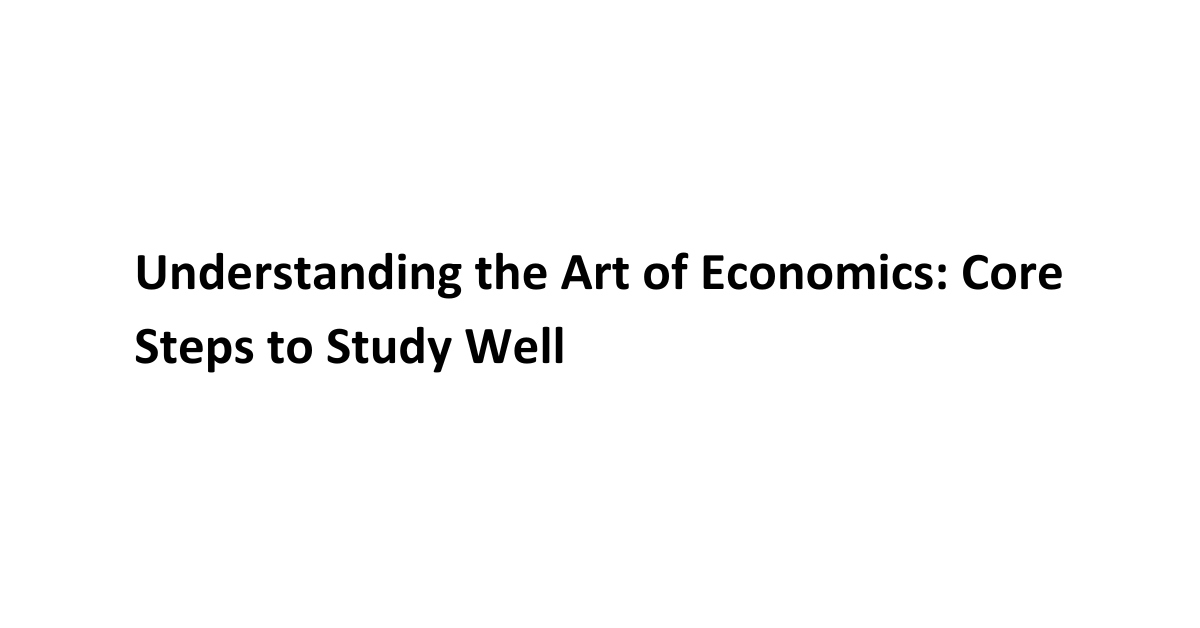
04 Oct Understanding the Art of Economics: Core Steps to Study Well
Economics is a fascinating field that delves into the complex web of human behavior, resources, and choices. Whether you’re a student striving for academic success or someone looking to understand the economic forces shaping our world, mastering the art of studying economics is essential. In this article, we’ll explore the core steps to study economics effectively and excel in your coursework.
1. Build a Strong Foundation:
Before diving into the intricacies of economic theory, it’s crucial to have a solid foundation. Start with the basics – understand the fundamental concepts like supply and demand, opportunity cost, elasticity, and utility. Textbooks and online resources can provide valuable insight into these foundational principles. Make comprehensive notes to consolidate your understanding.
2. Stay Organized:
Economics can be a content-heavy subject, filled with theories, models, and data. To stay on top of your studies, maintain a well-organized system. Create a study schedule that allocates specific time for each topic. Use tools like calendars, planners, or digital apps to manage your time efficiently. This will help you cover all essential topics and avoid last-minute cramming.
3. Actively Participate in Class:
Engaging in class discussions and actively participating in lectures can significantly enhance your comprehension of economic concepts. Don’t be afraid to ask questions and seek clarification when you’re unsure about something. Your professors and peers can provide valuable insights and perspectives that can deepen your understanding of the subject matter.
4. Practice, Practice, Practice:
Economics is a subject that requires practice to grasp fully. Work through problem sets, practice questions, and case studies. Applying economic theories to real-world scenarios will sharpen your analytical skills and prepare you for exams. Look for additional resources such as study guides and practice exams to reinforce your knowledge.
5. Create Concept Maps:
Economics often involves complex relationships between various concepts. Creating concept maps or diagrams can help you visualize these connections. For instance, you can map out the factors affecting supply and demand or draw a diagram illustrating the circular flow of income. Visual aids can make abstract theories more accessible and memorable.
6. Stay Informed:
Economics is a dynamic field that is constantly evolving. Stay updated on current events, economic policies, and global trends. Subscribe to reputable economics journals, websites, and news outlets to gain insights into real-world applications of economic theories. Understanding how economic principles are at play in the world around you can make your studies more engaging and relevant.
7. Seek Help When Needed:
Don’t hesitate to seek help if you’re struggling with a particular topic or concept. Economics departments often offer tutoring services, and your professors may have office hours where you can ask questions. Additionally, online forums and study groups can provide valuable support and alternate explanations to clarify difficult concepts.
8. Practice Critical Thinking:
Economics is not just about memorizing facts and figures; it’s about critical thinking and problem-solving. Challenge yourself to think critically about economic issues and formulate well-reasoned arguments. Analyze different viewpoints and consider the implications of economic decisions. Developing your critical thinking skills will serve you well in both your studies and in making informed decisions in the real world.
9. Stay Consistent:
Finally, consistency is key when studying economics. Make studying a regular part of your daily routine, and avoid procrastination. Consistent effort over time is more effective than cramming before exams. Remember that mastering economics is a journey, and the more consistent you are in your efforts, the more confident and competent you will become.
In conclusion, studying economics effectively involves building a strong foundation, staying organized, actively participating in class, practicing regularly, creating concept maps, staying informed about current events, seeking help when needed, mastering mathematical tools, practicing critical thinking, and maintaining consistency. By following these core steps, you can not only excel in your economics coursework but also develop a deep understanding of the economic forces that shape our world. Economics is a powerful tool for analyzing and influencing the world around us, and your dedication to mastering it will open doors to a world of opportunities.



Sorry, the comment form is closed at this time.